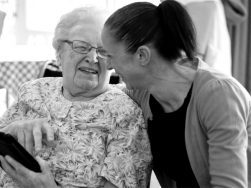
Everyone working in social care needs English, number, digital and employability skills, including team work, and problem solving skills. Together these are known as core skills.
Research by the Department for Business, Innovation and Skills suggests that workplaces with basic skills gaps (where one or more worker is unable to perform one or more specific literacy or numeracy task required in their day to day job), reported a range of costs to their businesses.
Efficiency-related costs were cited most commonly. Others included an increase in the number of errors made by staff, a constraint on the introduction of new and more efficient processes and a reduction in product or output quality.
Core skills in practice
Core skills in social care enable workers to provide high quality care and support, complete qualifications and training, and ensure services meet sector standards and regulatory requirements.
Core skills ensure social care workers can complete everyday tasks like:
- communicating with the people they support
- writing a care plan
- reading and following a risk assessment
- booking a health appointment online
- recording fluid intake and output.
Why we can’t ignore core skills in social care
Skills gaps in the sector
A report by UKCES claims that in the health and social care sector, around 19% of employers reported having skills gaps in their workforce (compared to 15% for total economy).

Core skills ensure you and your staff have the right skills to work and progress in the sector.
Social care is all about communicating
The #hellomynameis twitter campaign was started by Dr Kate Grainger who, after a stay in hospital, made the observation that many staff did not introduce themselves before delivering care.
High quality care is underpinned by good communication skills, one of the core skills needed as a social care worker.
The move to digital
In one survey, we found that 95% of participants used digital technology for at least one work related activity, including e:learning, assistive technology such as falls monitors, digital care plans, and telecare systems. Health and social care leaders have also called for action to make information and records available digitally by 2020.
Digital skills ensure your workers are confident using appropriate digital technology.
CQC requirements
Reporting is now an important aspect of any social care service, to ensure you can evidence how the care you provide meets CQC key lines of enquiry.
English skills, including writing, reading and spoken communication, ensure that this evidence is recorded accurately.
Skills for Care has resources to develop core skills in social care. If you’re a manager or team leader, there is a practical guide to help you develop the core skills of your workers.


 Bournemouth, Christchurch and Poole
Bournemouth, Christchurch and Poole  Hampshire County Council
Hampshire County Council  Lincolnshire County Council
Lincolnshire County Council  Norfolk County Council
Norfolk County Council  Northamptonshire Children’s Trust
Northamptonshire Children’s Trust  South Gloucestershire Council
South Gloucestershire Council  Wiltshire Council
Wiltshire Council  Wokingham Borough Council
Wokingham Borough Council  Children and young people with SEND are ‘valued and prioritised’ in Wiltshire, find inspectors
Children and young people with SEND are ‘valued and prioritised’ in Wiltshire, find inspectors  How specialist refugee teams benefit young people and social workers
How specialist refugee teams benefit young people and social workers  Podcast: returning to social work after becoming a first-time parent
Podcast: returning to social work after becoming a first-time parent  Podcast: would you work for an inadequate-rated service?
Podcast: would you work for an inadequate-rated service?  Family help: one local authority’s experience of the model
Family help: one local authority’s experience of the model  Workforce Insights – showcasing a selection of the sector’s top recruiters
Workforce Insights – showcasing a selection of the sector’s top recruiters 

 Facebook
Facebook X
X LinkedIn
LinkedIn Instagram
Instagram
Comments are closed.